- Home
- Joseph Robert Lewis
Wren the Fox Witch es-6 Page 11
Wren the Fox Witch es-6 Read online
Page 11
The man took up a stick from the ground and scraped his fingers over the end of it, and where he stripped away the dead bark the wood sparked and burst into flame. Wren looked down at her feet and saw the pile of kindling stacked up as high as her knees. The one-eyed man thrust his burning brand into the dark thicket on the ground, and instantly every stick and twig was dancing with yellow flames.
A tremendous wave of heat rolled up Wren’s body and a filthy column of black smoke raced up into her nose and mouth. Wren choked and shook, pulling and twisting against the ropes, and all she wanted to do was beg the silent people to help her, to cut her free, to put out the fire, but she couldn’t scream. She couldn’t even whisper. The smoke had reached deep into her chest and was crushing her lungs, and her heart was screaming as her eyes went dim.
No… Why would they do this? I never hurt them… them… wait… Who are they?
She tried to open her eyes and saw the blurry faces of the grim people around her beyond the flames.
They have no faces… They’re not real… This isn’t real!
The flames vanished, the people vanished, and the entire dark hilltop vanished. Wren crumpled to the ground, coughing and shuddering, feeling the cold smooth floor beneath her.
I’m alive. I can see.
Wren sat up, one hand pressed to her throbbing head. She squinted around at the balcony at the top of the Tower of Justice, at the view beyond the railing of the Palace of Constantine and the distant waters of the Bosporus. And standing at the railing was the witch, Baba Yaga.
A torrent of white aether blasted around and around outside of the tower, flowing past the balcony in icy waves of vapor and mist. But despite this maelstrom, the air inside the tower was perfectly still.
Aether can’t even stir the empty air. The only thing it can touch is a soul.
Wren coughed and saw the aether spilling out of her mouth. She pounded her chest as she got back up to her feet, and the world gradually felt more solid and heavy around her as the last fading claws of the nightmare slipped away, leaving her clear-minded but exhausted.
“Yaga!”
The old witch turned, her long white hair clattering quietly with the tiny bones in her braids. “You woke up? Good for you, little one. I’m impressed. A little.”
“What did you do to me?”
Yaga smiled. “You claim to be a student of the other worlds, a mistress of aether. You tell me.”
Wren swallowed and came a few steps closer to her. “You can move the aether, so you must have a rinegold object. Omar called them tuning forks, resonators, for moving aether.”
“Rinegold? You have a strange name for sun-steel, girl. And Omar? Is that your teacher?”
Wren blinked.
He must have used a different name when he knew her. Makes sense, really. It was five hundred years ago, after all.
“Yes.” She held up her right hand to display the tiny glimmer of dark gold. “I received this ring from my first mistress, Gudrun. It’s what I use to move aether.”
Yaga smiled and held up both of her arms. Four silver bracelets clattered on each of her arms, and in a narrow channel around the center of each one ran a slender golden wire. “These are what I use.”
Wren stared.
Eight of them!
She said, “And you used the aether to put me in that hell? To make me live out my own nightmares? Why?”
Yaga sighed. “Maybe you’re not as bright as I thought.”
Wren nodded slowly as she stared up at the massive aether whirlwind consuming the tower around them. “It wasn’t about me at all, was it? All this aether, all this energy… who is it for?”
“Them.” Yaga jerked her chin out at the palace below and the city beyond, a vast rippling plain of white and gray stone houses and shops, and gleaming gold churches. “I brought my precious boy here to help them win their petty war, and what do they do? Abandon him! Left him for dead on the walls of Stamballa two months ago, and did not make a single attempt to set him free. And now, now! There he is! Koschei the Deathless! The war god of Rus, the scourge of the Jochi hordes, the terror of the steppes, left screaming on a rope not one league from this place. And still they do nothing!”
The aether storm surged around them, momentarily obscuring the world behind a solid white wall of mist.
Two months ago? Wait, that’s when-
Below in the courtyard, a chorus of screams rippled outward from the base of the tower, and Wren peered down at the soldiers and servants lying on the ground, clutching their heads and curling up like terrified children wailing in the night.
“Stop it! They’re not immortal, they’re only human!” Wren wrapped her black jacket tightly around her shoulders. Insubstantial as it was, the aether was still leeching the warmth from the air. “Major Tycho and the other soldiers here, they’re only men. They’re trying to protect their homes, their families. You can’t ask them to risk everything for one man. Especially a man who can’t die. Sooner or later, Koschei will be free again. Maybe the Duchess will negotiate his freedom, or he’ll escape, or he’ll simply be set free when the war ends. He can’t die, Mistress Yaga! Your son will survive this, and you’ll see him again. You know that’s true, don’t you?”
“And until then?” The tall witch turned to glower down at the younger woman. “Until then, my son has to suffer unspeakable torments, hour after hour, day after day, just because he can’t die? Is that right? Is that fair? He may only be one man, but he is my son! My only son! And if he can have no peace, if I can have no peace, then no one will have any peace!”
She threw her arms up and her sun-steel bracelets rang as they crashed against her wrists, and the aether roared straight up the sides of the tower, streaming up into the late afternoon sky.
Wren stood at the railing beside her, gazing up at the mist cascading upward with all the fury of a massive waterfall.
When the sun goes down, and the temperature falls, the aether will only grow thicker all across the city. And when she can command that much aether… Woden, help these poor people.
Chapter 11. Negotiations
Salvator Fabris stood in the anteroom, exchanging glares with the Turkish guards by the office doors, and by the hallway doors, and by the windows. Each of the men in blue uniform wore a scimitar of Damascus steel, and a Numidian two-shot pistol, and an eclectic collection of mismatched daggers. The Italian sighed, wondering idly how the soldiers kept their belts from falling down under all of that weight.
“It’s been over an hour,” he said in his best Eranian to no one in particular.
None of the soldiers answered.
His left hand went to his own belt, again, and pawed uselessly at the void where his own golden rapier should have been, again. It had galled him to leave his prized possession with the chief of the Hellan armory before he left Constantia, but he knew the weapon would not be allowed into Prince Radu’s presence, and he didn’t trust the Turks to return it to him.
“The last time your ambassador came to the Palace of Constantia, he was shown into a private office where a page kept him quite content with wine and an assortment of cheeses until his meeting with the Duchess,” Salvator said loudly. “I would have thought you might show me the same courtesy, this time. But I see the war effort has strained your resources considerably. You haven’t even a single chair to spare for me, let alone for these eight valiant gentlemen who are doing such a fine job of guarding an empty room and an unarmed guest.”
The hallway door opened and the Turkish ambassador strode in. He was a rotund little man with huge soft jowls and a tiny black mustache plastered to his lip with oil. His suit was well-made but either it had been poorly measured or the ambassador had grown considerably around his middle, because his trousers and shirt were straining under his belt.
“Ah, Fabris!” he cried with a smile. “Such a pleasure to see you again, of course. I hear you have some new proposals and such to share with us, so I hurried down from the temple as quickl
y as I could.”
“I’m here to speak with the prince,” Salvator said. “Not you, Murat.”
“Oh, yes, of course, but Prince Radu is a very busy man. He is meeting with architects and artists from across the empire, you know. He is planning a most glorious renovation of poor Constantia. I’ve described to him its hideous state of decay and he is most eager to see it restored and rebuilt, once it is part of the empire, of course.”
“Of course.” Salvator sniffed and stared out the window at the slate rooftops of Stamballa and the gleaming domes of the Mazdan Temples. “You do realize of course that, as an Italian, I don’t give a damn about Constantia at all, and nothing you say about it is going to make me angry. I should also point out that nothing you say will make you any less of a fat pustule, or make me any less handsome.”
Murat’s smile faltered.
“Now about that chair.” Salvator peered down his nose at his counterpart and gracefully plucked at his long, silvery mustache.
Murat huffed, cleared his throat, glanced at the soldiers, and went back out into the hallway.
Another hour passed before the hallway doors opened and Prince Radu strode into the anteroom with a dozen grim-faced generals and perfumed servants trailing behind him. The Vlachian prince was a younger version of his brother, but everywhere Vlad was hard and crooked and dark, Radu was softer and straighter and brighter. He smiled easily and moved with the practiced grace of a court dancer.
Salvator performed a grandiose bow and said, “Your Highness, it is an honor and a privilege to see you again. I hope you have been well since our last meeting.”
Radu paused at the doors to the inner office. “Quite well. And you?”
“Never better, Highness.”
Radu glanced back at his retinue. “You should really handle Murat a bit more gently, you know. He’s a fine accountant, but he doesn’t have your wit.”
“No, he doesn’t.” Salvator smiled. “I’ll try to keep that in mind in the future.”
“Your little friend, the major, he is not with you?”
“He was injured this afternoon. Nothing serious, but he couldn’t join me.”
“I’m sorry to hear it. I like him very much. So, is it business or pleasure today, my friend?” Radu opened the office door and led the way inside. He tossed his coat onto the back of the chair behind the desk.
Salvator sauntered inside and several clerks and guards shuffled in behind him to stand along the walls. “Business, if you can call it that. We caught your afternoon performance by the waterfront. I imagine if we were all quiet enough, we could hear the endless encore even now.”
Radu sighed. “These damn immortals. You know, for weeks, we’ve tried to learn his secret. How does he do it? Why can’t he die? Interrogations, torture. Nothing worked, of course.”
“You want to know why he’s immortal?” Salvator shrugged. “I suppose I can see the appeal, especially for a handsome young fellow like yourself. Couldn’t you simply ask your own immortal about it? The Damascena?”
Radu smiled. “You know as well as I do that she does not serve me, does not answer to me in any way. Ask her about immortality? Ha! If I could simply find her, it would be a memorable day. That woman has been a mystery to the Emperors of Eran for ages.”
Salvator chuckled. “It’s good to know we have that in common. And it’s very good to know that you couldn’t pry any secrets from your prisoner.”
“Hmph.” Radu settled into his chair and glanced at the papers on his desk. “Koschei is like a stone. He’s a brute, dressed in half-rotten skins and bloody furs. The only thing of any value we found on him was this.” The prince reached inside the neck of his starched shirt and pulled out a slender black chain from which dangled a small golden pendant.
Salvator squinted at the lumpy trinket. “What is that?”
Radu frowned at it. “I’m not sure, really. It looks like a human heart, vaguely.” He tucked it back into his shirt. “It seemed important to him, so naturally I tried to destroy it. Perhaps it’s a gift from his mother, yes? But my smiths cannot melt it down in their hottest forges, and they cannot smash it with their strongest engines. Ridiculous, isn’t it? So, here it remains.”
One of the clerks slipped out of the room.
Salvator went over to the window and stared at the darkening clouds over the Strait. “I don’t know exactly what you hoped to accomplish with Koschei, but it is having an effect.”
“Ah.” The prince nodded. “Your men are angry and afraid. Some of them will no doubt attempt an ill-fated rescue mission tonight under cover of darkness. They will be slaughtered.”
“The Hellans look scared,” Salvator said. “The Vlachians seem angry. But none of that compares to what’s happening in the witch’s tower. Koschei’s mother is… well, see for yourself.” He pointed at the distant city skyline.
Radu came around the desk and stood beside him. “What is that?”
Across the water, a pale gray cyclone rose from grounds of the Palace of Constantine. It spiraled up into the dark sky where a light scattering of clouds were just beginning to shift and turn around the vortex.
“I’m told it’s aether,” Salvator said. “And any man who gets too close to it falls to the ground, screaming like a child. We had to evacuate half the palace.”
Radu cast him a doubting glance. “Why would you tell me this?”
“Hm?” Salvator raised an eyebrow. “Oh, I simply thought you’d want to know. After all, you butchered Koschei outside our walls to prod some sort of reaction from us, didn’t you? Well, there it is. Koschei’s mother is reacting.”
The prince sighed. “Baba Yaga? I’ve heard the stories, of course, but I left Vlachia when I was very young, long before she visited Vlad. I never met her, or Koschei, at the time. What is she like?”
“She’s quite distasteful.” Salvator paced away from the window. “She’s selfish, childish, unpredictable, and most importantly, she has a startling array of strange abilities that are making life in Constantia very unpleasant at this moment.”
Radu nodded sternly. “Good.”
“I’m afraid it isn’t good at all, Highness,” the Italian said. “You see, our aether expert has told us that when the sun sets and the temperature falls tonight, the aether will grow thicker. Much thicker. And that annoying little tornado over the palace will become a massive storm, hurling aether across both cities, and then you too will have men lying in the streets, screaming like children.”
The prince paused. “I don’t believe you.”
There was a knock at the door. “I’m afraid you should believe him, Your Highness.”
Salvator turned. An older gentleman stood in the doorway dressed in long, heavy green robes and in the thick black sash around his waist was the familiar scabbard and grip of a seireiken.
So the Sons of Osiris are here after all.
The Italian stepped quickly forward and held out his hand. “I don’t believe we’ve been introduced, Signore…?”
The shorter man shook his arm free of his sleeve and embraced the offered hand. “I am Master Iruka of Alexandria, advisor to the holy prince.”
Salvator carefully gauged the man’s handshake, noting the rough palm and warm skin, and the thick veins around the wrist.
A fighter. A strong one.
“Salvator Fabris, ambassador from Her Grace, the Duchess Nerissa.”
“A pleasure.” Iruka nodded curtly as he slipped his hand back into his long sleeve as he turned to the prince. “My lord, what the ambassador has said is true. If that is indeed a storm of aether, when the sun sets it will surely grow larger and more powerful. And there will be nothing I or anyone else here can do to stop it.”
Radu frowned very intently at the man in green. “And when it reaches us, you believe we will all be reduced to screaming children, lying on the ground, as Signore Fabris claims?”
“If that is what the aether is doing to the Hellans, it will certainly have the same effect on ou
r own people.” Iruka bowed his shaven head.
Radu glared at both of them as he circled back around his desk and dropped heavily into his chair. “Immortals, aether, plagues! Vlad is grasping at straws. He knows he cannot defeat me, he knows that Constantia must fall and the Church with it. The empire will rule both banks of the Bosporus. It is inevitable. Why can’t he see that!?” He gripped the arms of his chair.
“I don’t presume to speak for your brother,” Salvator said calmly. “But I’ve come to know him fairly well these past few months, and I can say with some certainty that he will defy you simply to defy you, Highness. If any other man sat in your chair, Vlad would never have left Vlachia to join the war and Constantia might already be conquered. Vlad is not here for the city, or for the Church, or even for Lady Nerissa. He’s here to fight you. To spite you. To punish you.”
“Really?” Radu looked up, his body beginning to sag as he slumped lower in his chair.
“Yes. You left your country and your family and your faith,” the Italian said. “And he took that very personally.”
“That’s all very interesting, but it has little bearing on the matter at hand. Iruka, how do I defeat a storm of aether?”
The Aegyptian bowed his head once more. “I am sorry, Your Highness. But these are uncommon arts. Aether-craft is still a rudimentary science, at best. No one of my order could possibly defeat someone as powerful as Baba Yaga.”
“You don’t have to defeat her,” Salvator said. “She’s a dreadful creature, but not a mysterious one. You’re torturing her son right in front of her, and she’s throwing a fit. The only difference between her and a fishwife is that when a fishwife stamps her foot the heavens don’t roar in agreement with her.”
“So what?” Radu glared up through his black brows. “You want me to free Koschei to stop Yaga’s tantrum? Just let him go? Give Vlad back his greatest warrior, an unkillable Rus juggernaut? Never.”
“We could come to some arrangement,” Salvator said. “An exchange of assurances. You return Koschei, and we send him and his mother back to Rus. We remove both of them from the equation. That would satisfy everyone, wouldn’t it?”

 Daphne and the Silver Ash: A Fairy Tale
Daphne and the Silver Ash: A Fairy Tale_preview.jpg) Wreck of the Frost Finch (Aetherium, Book 0 of 7)
Wreck of the Frost Finch (Aetherium, Book 0 of 7) Chimera The Complete Duet
Chimera The Complete Duet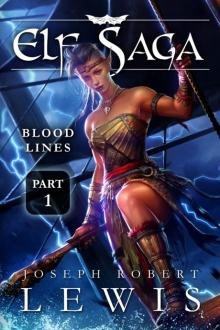 Elf Saga: Bloodlines (Part 1: Curse of the Jaguar)
Elf Saga: Bloodlines (Part 1: Curse of the Jaguar)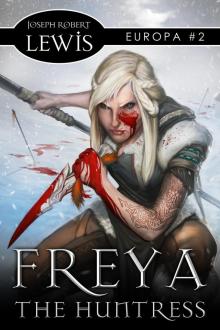 Freya the Huntress (Europa #2: A Dark Fantasy)
Freya the Huntress (Europa #2: A Dark Fantasy)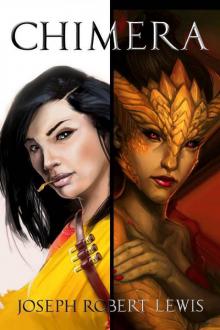 Chimera esd-7
Chimera esd-7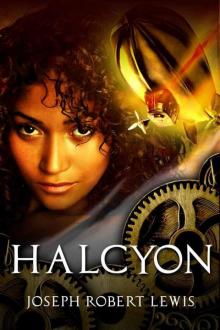 Halcyon est-1
Halcyon est-1 Europa
Europa The Dragon and the Lotus (Chimera #1)
The Dragon and the Lotus (Chimera #1)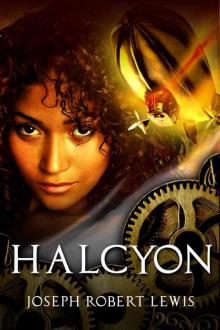 Halcyon (The Complete Trilogy)
Halcyon (The Complete Trilogy) Ultraviolet
Ultraviolet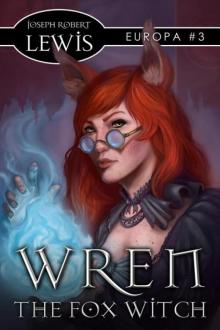 Wren the Fox Witch es-6
Wren the Fox Witch es-6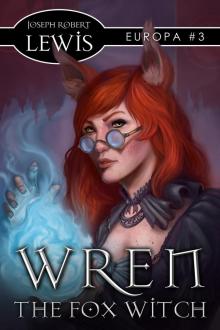 Wren the Fox Witch (Europa #3: A Dark Fantasy)
Wren the Fox Witch (Europa #3: A Dark Fantasy) Omar the Immortal es-4
Omar the Immortal es-4 Aetherium (Omnibus Edition)
Aetherium (Omnibus Edition)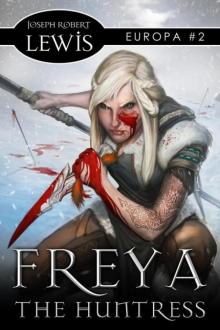 Freya the Huntress es-5
Freya the Huntress es-5